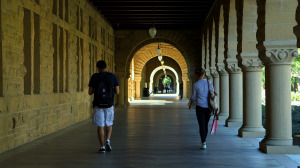
Directed and produced by Emmy-nominated filmmakers Andrew Rossi and Kate Novack, “Ivory Tower” takes a hard look at the college debt bubble and the future of higher education in America. Traversing the lecture halls of Harvard and Stanford and the offices of education startups Udacity and Coursera, “Ivory Tower” aims to bring to light the unsustainable arms race for prestige that colleges find themselves in. It questions whether Americans have strayed from the original intent of this education. The documentary never provides solid solutions to the questions it poses, but its emotionally gripping student narratives and startling statistics will encourage you to think more deeply about the value of your Stanford education.
“Ivory Tower” first sets the stark landscape in which high school seniors applying to college will find themselves. Student loan debt in the U.S. is over $1 trillion and rising, graduation rates have stagnated or decreased, and college tuition rates have increased by 1120% since 1978, faster than either the price of health care or food. Using interviews with education experts such as Andrew Delbanco of Columbia University and Clayton Christensen of Harvard Business School, the documentary accuses colleges of falling into the trap of buying their way to the top of college-ranking lists, creating a punishing cycle in which tuition rates climb higher and higher every year.

Frustrations with the rising costs come to a head during the Cooper Union student protests in 2013, when for the first time in the university’s 150-year history, students were charged with tuition. Cooper Union’s president, Jamshed Bharucha, is made out to be the villain of the documentary, a figurehead for the corrupt “college-as-a-business” model. His twitchy nervousness and ineloquent responses to his interviewer make him unlikable to audiences. His icy pragmatism in charging tuition to balance the college’s debt stands in direct opposition to the Cooper Union students’ more idealistic desire for a free education. The documentary’s heavy emphasis on Cooper Union’s shift to a charging tuition indicates a future that does not bode well for high school seniors who do not have the means for a quality education.
But hidden underneath all the bleak premonitions regarding the future of higher level education is an earnest call for change and a slight glimmer of hope. Daniel Boone, a freshman at Harvard at the time of filming, tearfully admits that his dorm room at Harvard is the first bed in which he has slept in a year. Brooke Brewster of Spelman College fervently believes college to be a safe space where conversations about race, sexism and personal growth can occur. Their histories of struggling in low-income households and belief in college as an opportunity for social mobility makes the case that higher level education still has value, but colleges’ original goals of creating learned citizens, set forth by the GI Bill, Higher Education Act of 1965 and Morrill Act of 1862, were lost somewhere in university financial statements and the constant push for prestige.

In contrast to the money-hungry universities of today, the documentary does attempt to point out some alternatives to traditional college education. Most notably, Deep Springs College in California’s Death Valley provides free education to 26 college-age men where students spend half of their time in class, engaged in Socratic discussions, and the other half on the ranch, doing chores for the small community, all in preparation for a life of service. Former Stanford professors Daphne Koller and Sebastian Thrun and their online education startups, Coursera and Udacity, respectively, are featured extensively. However, Udacity’s failed partnership with San Jose State University and Deep Springs’ lack of name recognition leaves audiences ambivalent as to the effectiveness of these different forms of education. Though the documentary breaks down the myth that traditional college is the only surefire way to a job in a depressed economy, it does little to build confidence in these failed or failing forms of alternative education.
“Ivory Tower” manages to provide a wide-ranging overview of the issue of student debt and the future of college education but only skims the surface of these differing perspectives, perhaps leaving room for audience members to form their own opinions. While we are left with the odd feeling that the current issues with higher level education seem almost insurmountable with no clear solution in sight, we are also left with a feeling of hope — hope that there are students benefiting from the system in place and hope that there are people working to help the students who are not.
Contact Diana Le at dianale ‘at’ stanford.edu.
